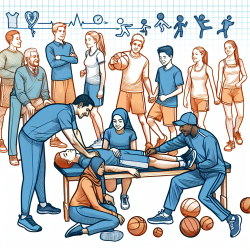Family-Centered Care: A Winning Strategy for Athletic Trainers!
Family-Centered Care (FCC) is an approach that emphasizes collaboration between families and healthcare providers, making it a vital component in the care of underage patients in school-based health systems. The research article "Practices and Perceptions of Family-Centered Care: A Cross-Sectional Survey of Secondary School Athletic Trainers" sheds light on the importance of FCC in athletic training. This blog aims to help practitioners enhance their skills by implementing the outcomes of this research or encouraging further exploration.
Understanding Family-Centered Care
FCC involves the active participation of families in the care process, ensuring that their insights and preferences are integrated into the decision-making process. This approach is particularly crucial for secondary school athletic trainers who work with underage patients. The study highlights four themes essential for enhancing FCC: limited education and resources, staffing and space concerns, non-technical skills, and social determinants of health.
Key Findings from the Research
- Current Practices vs. Perceived Necessity: The study found that the mean score for current practices (CP) was significantly lower than the perceived necessity (PN) for FCC. This indicates a gap between what athletic trainers practice and what they believe is necessary.
- Parent-to-Parent Support: This was identified as the most practiced and highly perceived necessary element of FCC. Athletic trainers see the value in shared experiences among parents, which can reduce worry and enhance support systems.
- Developmental Needs: This element was the least practiced and perceived necessary. The study suggests that athletic trainers should focus on the emotional and social components of care, especially after an injury.
- Family as the Constant: Recognizing that families remain a constant support system is crucial. Athletic trainers should aim to build trusting relationships with families to improve care outcomes.
Improving FCC Practices
To bridge the gap between current practices and perceived necessity, athletic trainers should consider the following strategies:
- Enhance Communication: Develop multiple communication channels that cater to the needs of families and avoid medical jargon.
- Focus on Education: Prioritize family and patient education to encourage collaboration in care plans.
- Leverage Social Capital: Use the family as a resource to build relationships focused on trust and shared goals.
- Address Social Determinants: Consider the social determinants of health when integrating FCC into practice.
Conclusion
Family-Centered Care is a crucial element in the effective practice of athletic trainers in secondary schools. By implementing the strategies outlined in this research, practitioners can enhance their FCC practices, leading to better outcomes for student-athletes and their families. For those interested in delving deeper into this topic, further research and professional development are encouraged.
To read the original research paper, please follow this link: Practices and Perceptions of Family-Centered Care: A Cross-Sectional Survey of Secondary School Athletic Trainers.










